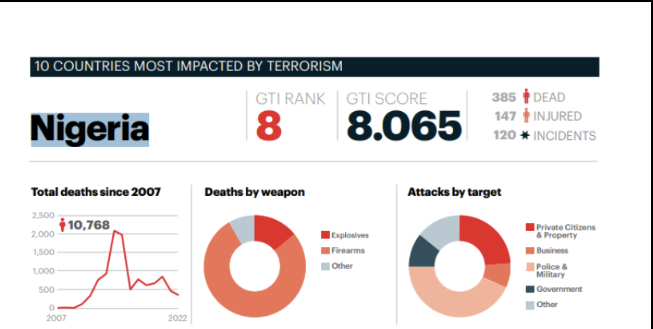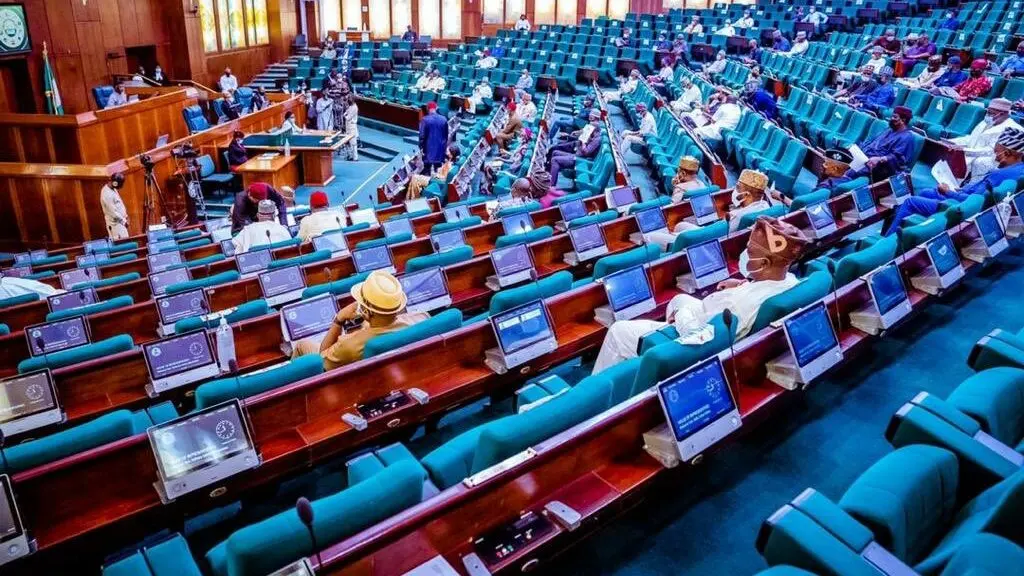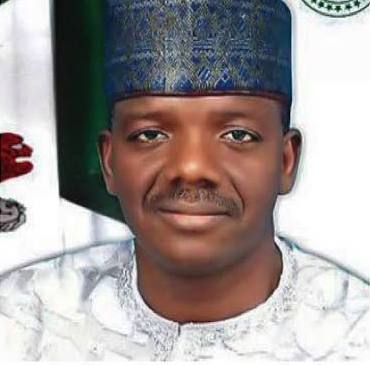COVER
Nigeria Ranks 8th Country with Worst Terrorism Impact

Nigeria has been ranked 8th position among countries with worst terrorism impact, in the latest report released by the Global Terrorism Index (GTI), moving down two steps from its place in 2022, an indication that the nation’s ranking has improved.
The report, which is published annually by the Institute for Economics and Peace (IEP), provides a comprehensive summary of the key global trends and patterns in terrorism since 2000, and attempts to systematically rank countries according to terrorist activities.
According to the index for 2023, a continuous decline in the number of deaths from terrorism has seen Nigeria move down the ladder of nations most impacted by terrorists.
In the Sub-Saharan region, Ethiopia was the most improved country in 2022,
with the country continuing to record zero terrorism-related deaths for the sixth consecutive year. Al-Shabaab were responsible for two attacks in Ethiopia in 2022, however no deaths were recorded.
Nigeria recorded the largest decrease in the number deaths from terrorism in the region in 2022. Deaths fell by almost a quarter, from 497 in 2021 to 385 in 2022, and are now at their lowest level in Nigeria since 2011.
This fall in deaths was driven by a marked decrease in deaths attributed to ISWA,
with the group being responsible for 57 attacks in 2022, compared to 79 in 2021
The GTI further disclosed that the spatial dynamics of terrorism have changed over the last two years in the Sahel.
“Previously, northeastern Nigeria along with Chad, Cameroon and Niger was the epicentre of terrorist activity, with ISWA and Boko Haram responsible for most of this.
“Since 2020, deaths from terrorism have declined in Nigeria’s Borno State and the neighbouring areas of Chad, Niger and Cameroon.”
However, there are indications that terrorism’s spatial dynamics in the Sahel are shifting from northeastern Nigeria to the tri-border area of Mali, Burkina Faso and Niger and this marks the further trans-nationalisation of terrorism across
the Sahel, and beyond to coastal West Africa.
“Groups like IS and JNIM are also seeking safe havens and new theatres of
operations. Many of these new areas are demographically, economically and ecologically similar to regions in Mali, Nigeria, Burkina Faso and elsewhere, from which jihadi groups initially emerged over a decade ago.
“This trend is not uniform but, as Niger and Nigeria both recorded improvements in their scores. Other Sahelian states such as Mauritania, Senegal and the Gambia continue to experience little-to-no terrorism”.
Meanwhile deaths have rapidly intensified in the tri-border regions of Mali, Burkina Faso and Niger (also known as Liptako-Gourma), driven by the growth of IS affiliates and JNIM. Between 2012 and 2022 Mali, Burkina Faso and Niger became the epicenter of Sahelian terrorism.
Prior to this, deaths in Nigeria peaked in 2014 at 2,101 deaths before declining in five of the subsequent nine years. After recording 865 deaths in 2020, deaths from terrorism in Nigeria decreased by 43 per cent in 2021 and 35 per cent in
2022.
While things seem to have improved in Nigeria, still experts say the country faces a significant threat posed by armed extremist groups such as Boko Haram and ISWA.
Boko Haram’s decline has resulted in a substantial improvement in terrorism in Borno State, which experienced a decrease of 12 per cent in terrorism-related deaths when compared with the year prior. Attacks in the state also decreased from 91 to 48 respectively, a decrease of 47 per cent.
ISWA is now the most prominent group in Borno State, recording 40 incidents that resulted in 168 deaths in 2022, compared to Boko Haram’s six incidents and 63 deaths. The state, however, remains the hardest-hit region in Nigeria for terrorism, accounting for 60 per cent of all terror-related deaths in 2022.
The deadliest terror attack of the year occurred in Borno State, when gunmen killed 50 civilians who were accused of informing on the terrorists’ movements to security forces. ISWA claimed responsibility for the attack, saying it had targeted ‘spies’.
The GTI notes that the conflict between ISWA and Boko Haram that culminated in
the death of Boko Haram leader Abubakar Shekau in May 2021, continued into 2022. Severe defeats, mass defections of operatives to ISWA, as well as counter-terrorism efforts by the Nigerian government and foreign military forces, have
significantly weakened Boko Haram’s impact in Nigeria.
As a result, ISWA has become significantly stronger and continues to expand its area of activity in north-eastern Nigeria and the Lake Chad region. Activity by terrorist groups such as ISWA is expected to increase in the lead up to, and following, February’s presidential elections, as groups exploit tensions caused by the elections.
COVER
United Capital Declares N5.89bn PAT in Q1
United Capital Plc, a pan-African financial services group, has posted N5.89 billion as its Profit After Tax (PAT) for the first quarter ended March 31, 2025.This is against the N3.59 billion recorded within the same period in 2024.The group in a document posted on the Nigerian Exchange Group (NGX) platform yesterday, said the figure represented a 64 per cent increase from the amount recorded within the same period in 2024.
The group also declared N13. 1 billion as its gross earnings for the first quarter representing a 113 per cent increase from the N6.1 billion posted for the corresponding period of 2024.It further posted N6.73 billion as its Profit Before Tax (PBT) for the first-quarter, representing 65 per cent increase from the N4.1 billion declared within the same period last year.The United Capital Plc declared that its total assets stood at N1.72 trillion as at March 31, representing a one per cent increase from the N1.7 trillion recorded as total asset as at December.It said the shareholders’ funds grew to N161.2 billion compared to N133.50 billion recorded in December.The group added that the growth in shareholders’ funds represented a 21 per cent increase from the amount also recorded in December.United Capital Plc offers Investment Banking, Asset Management, Trusteeship, Securities Trading, Wealth Management, Consumer Finance and Microfinance Banking.COVER
Atiku Vows not to Leave PDP, Insists Coalition ‘ll Challenge APC

By David Torough, Abuja
Atiku Abubakar, the 2023 presidential candidate of the Peoples Democratic Party, PDP, has dismissed insinuations that he was planning to dump the party for ruling All Progressives Congress, APC.Speaking with PDP women members of the Board of Trustees (BoT), who visited him to help save the party from total collapse, the former Vice President insisted on a coalition to push out the APC-led government in 2027.
Atiku Abubakar said that the coalition movement was not just a political strategy, but a necessity to challenge the ruling party and rebuild the country. It was gathered that Atiku told the women, led by the former Minister of Women Affairs and ex- National Women Leader of the party, Hajia Inna Ciroma, that a coalition is workable, and would assure good results.According to him, the National Party of Nigeria, NPN, the ruling party in the Second Republic, had formed an alliance with the Nigeria Peoples Party, NPP, and it was called the NPN-NPP accord.He added that when the coalition is achieved, the name of PDP will not be affected.Atiku Abubakar was said to have told the PDP women about the status of the pan-Nigerian coalition that he was building in conjunction with other leaders and stakeholders across political divides and regions.He informed them that the movement was being powered by Nigerians desirous of reclaiming and rebuilding their country from across the nooks and crannies of our country.No way Nigeria can be one-party state – Gov SuleNasarawa State Governor, Abdullahi Sule yesterday said despite the gale of defection, there is no way Nigeria would become a one-party state.Governor Sule also said that people are defecting from the opposition political parties to the ruling party, the All Progressives Congress, APC, because of the reforms put in place by President Bola Tinubu, which he said have started yielding positive results.Speaking to State House correspondents after meeting behind closed doors with President Tinubu at the Presidential Villa, Abuja, the governor said that every politician would always like to identify with the ruling party.He said that he came to visit the President, who is the leader of the APC, to discuss state matters.He said, “I have two major issues to discuss with him. One, about my state, and two, about my party, especially relating to my state. So, those were the two major issues we discussed. You know, in Nasarawa State, we are trying to do a lot.“Just yesterday, we received special recognition in the areas of agriculture and renewed energy, that is, mini-grids that we are having all over the country. So, you know, Nasarawa now has the highest number of mini-grids in the country because of the effort in agriculture and mining. So, those were the kind of things we discussed with Mr. President.”Fielding questions on his impression about the arrays of defections seen from the opposition to the ruling party, he said that it was Tinubu’s performance that was attracting the opposition elements to the ruling party.According to him, “It’s a reflection of the performance of our party and the performance of Mr. President. Mr. President is carrying out a lot of reforms. We saw the first reforms in the area of the unification of the effects.“We saw another one in the removal of subsidy. We have seen one now in the power sector. In fact, one of the ones that interests me that we are doing is the one on skill acquisition and agriculture.“So, when you are beginning to see a lot of these efforts, a lot of these reforms, nearly every reform will come with its ups and downs. You know, but the advantages of some of these reforms far outweigh the disadvantages. So, as a result of that, people who are happy with what they are seeing are the people who are returning to the party.“So, I think the party is doing well, and for that reason, the President is also doing well. And that is the reason why people are joining.”Responding to the insinuation that the country may be heading towards a one-party state, he said:“I think I have answered this twice or three times now. I don’t believe, by the slightest of imagination, that we are going to be a one-party state. If you look at it, no matter how successful we are, even America, for instance, has the Republican Party and the Democratic Party, you still have the Green Party and so many other political parties that you don’t hear about. So, the same thing with Nigeria.“No matter what happens, there are people who are going to be at another party. Actually, we don’t even want Nigeria to be a one-party state. We just want to be the dominant party.“We just want to be the winning party. We just want to be the party. If we can win 90% of the votes, okay, that’s it.“The other parties can win 10% of the votes. I’m not being sarcastic. I’m just trying to be serious with you.“There is no way we can be a one-party state. But every party wants to be the dominant party. Every party wants to win elections.“Every party wants to be able to give back to society and to give back to the people. And I think that’s what our party is doing.”Giving an update on lithium battery production in his state after its launch, Governor Sule said: “Well, Nigerians actually should know this. We commissioned the first one that you are talking about last year by the Senate President on behalf of Mr. President, and that’s about 3 million metric tons per annum.“In the next two months, you are coming to commission another one that is going to be three times the size of that one in Nasarawa State. And then there are about three other ones that are coming up by the end of the year.“So, we are beginning to see more and more development of lithium and tantalite and so many other minerals that we are having in the state.“So these are the kinds of things that I talk to you when I say reforms about things that are happening. And when I mentioned to you that we are having the highest number of mini-grids in the country, you know, people didn’t even know why.“One of the reasons is because there are so many of these small-scale companies that are operating, you know, agriculture, mining also, and they all need power.“So what they do is that they require a mini-grid in their own location so that it can power their operations. And we are lucky in Nasarawa State, you know, it has been very peaceful. You know, so that’s what a lot of investors are looking forward to.COVER
Reps Lack Authority to Summon Zamfara, Benue Govs, Says Shinkafi

By Eze Okechukwu, Abuja and Attah Ede, Makurdi
Former National Secretary of All Progressives Grand Alliance (APGA), Dr. Sani Shinkafi, has condemned the House of Representatives’ decision to summon the governors of Zamfara and Benue states, asserting that the move is unconstitutional.
He spoke to journalists in Abuja yesterday ahead of the scheduled appearance of the governors and the state assemblies’ leaders on May 8, following a press release from the House Committee on Public Petitions. Shinkafi emphasised that the House of Representatives lacks the constitutional authority to intervene in the internal affairs of state governments.“Certainly, the House of Representatives Committee on Public Petition has no constitutional power to summon democratically elected governors or State Assembly leaders to a public hearing on strictly internal affairs of their states,” he stated.He criticised the petition from the civil rights organisation, Guardians of Democracy and the Rule of Law, as politically motivated and aimed at undermining democratic structures in Zamfara and Benue.He pointed out that the National Assembly’s investigative powers, as outlined in Sections 88 and 89 of the Constitution, do not extend to summoning state governors for matters strictly related to state governance.“The principle of separation of powers by the executive, legislature, and judiciary is equally enshrined in the constitution for effective governance,” Shinkafi noted.He emphasised that the ongoing activities of the Zamfara State House of Assembly demonstrate its ability to function effectively, with 15 out of 24 members still actively conducting legislative business despite the recent suspension of some members.Furthermore, Shinkafi rejected the notion of declaring a state of emergency in Zamfara, asserting that the state is not facing a clear and present danger that warrants such drastic measures.“There is nothing whatsoever that warrants the House of Representatives to summon the governor and Assembly leadership for a public hearing,” he said, commending Governor Dauda Lawal for his achievements in transforming the state within two years.He urged the House of Representatives to engage with security agencies rather than pursue what he termed a ‘frivolous’ petition.Shinkafi called on the House of Representatives to reject the petition and uphold the principles of democracy and rule of law, noting that genuine grievances should be addressed through the judicial system rather than political pressure tactics.“Nigerians expect the House of Representatives to have invited service chiefs and the Inspector General of Police who have the constitutional mandates to safeguard the nation,” Shinkafi added.Benue Assembly Directs Speaker, House Leaders to Shun Reps’ InvitationThe Benue State House of Assembly yesterday, passed a resolution calling on its Speaker Hyacinth Aondona Dajoh, to disregard the summons from the National Assembly Public Petition Committee.The house argued that the summons contravene the Constitution of the Federal Republic of Nigeria (1999) as amended, adding that they are already planning to take legal action against the National Assembly.The house further requested the Nigerian Bar Association (NBA) and the Inspector General of Police to investigate the individuals who signed the petition.The Benue State House of Assembly also called on the National Assembly Caucus from Benue State (Senate/Reps) to come for proper engagement with the house to ascertain while the State is portrayed in bad light at the National Assembly.Lending his voice to the petition sent by the National Assembly summoning the Speaker and leadership of the Assembly to appear on Thursday 8th May 2025, Majority Leader of the House Saater Tiseer said the notice sent by the National Assembly is out of ignorance.He said, by the Constitution of the Federal Republic of Nigeria, the Benue State House of Assembly is not answerable to the National Assembly, saying section (101) has given the house the powers to legislate on its business without external control.Member representing Katsina- Ala West State Constituency Hon. Bemdoo Ipusu accepted the decision of the house to take the National Assembly to court and added that the house should include the Guidance of Democracy for misleading the National Assembly.Hon. Ipusu noted that the group in mentioning the names of the suspended members mentioned Hon. Peter Uche which shows that the group lacks knowledge of what transpired on the floor of the house that day.He wondered why the National Assembly would want to take over the functions of the Assembly that is vibrant and performing its duties effectively, noting that the three arms of government in the State are not fighting each other.Members including Micheal Audu and Hon. Peter Uche condemned in totality the decision of the National Assembly and urged the Speaker and the leadership not to appear.A statement by the chief press secretary to the speaker, Terver Zamber, quoted Uche as saying he is still performing his duties in the house as elected and expected by his people and wondered why the group included his name alongside those suspended, saying the act clearly shows that the National Assembly was not properly informed.Senate Sets up 18 Member Committee to Oversight Rivers AdministratorThe Senate yesterday set up an 18-man Committee to oversee the implementation of the state of emergency declared in Rivers State nearly two months ago by President Bola Tinubu with Senate Leader, Bamidele Opeyemi as Chairman and Rufai Hanga, Deputy Minority Whip as the Vice Chairman and Charles Bala, Clerk of the Committee.This was even as the Benue State House of Assembly yesterday passed a resolution calling on its Speaker Hyacinth Aondona Dajoh, to disregard the summons from the National Assembly Public Petition Committee.The Committee which was set up by the Senate President, Godswill Akpabio during plenary yesterday was tasked with the monitoring of governance in the south-south state.While announcing the Committee, Akpabio said there was a need to have a Committee like the House of Representatives to oversight the state of emergency rule in which the Sole Administrator, Ete Ibas was already sworn into office.Speaking further, Akpabio said, “if there is need for a review, it will be after further consultation with our colleagues. But in the meantime, they have to get to work immediately. This effort is to enhance democratic principles and ensure good governance in Rivers state “.However, other members of the Committee are Senators Adamu Aliero (PDP, Kebbi State), Osita Izunaso (APC Imo), The distinguished Senator Osita Ngwu (PDP Enugu State), Senator Kaka Shehu APC Borno Central), Iya Aminu Abbas (PDP Adamawa), Tokubo Abiru (APC Lagos), Adeniyi Adegbonmire, (APC Ondo), Mohamed Sani Musa, (APC Niger), Simon Lalong, (APC Plateau), Asuquo Ekpeyong, (APC Cross River), Adams Aliyu Oshiomhole (APC Edo), Ireti Kingibe, (Labour Party FCT), Onyekachi Nwaeboyi, (APC Ebonyi State, Idiat Adebule (APC Lagos State), Ede Dafinone (APC Delta), Mohamed Maidori, (APC Jigawa).














